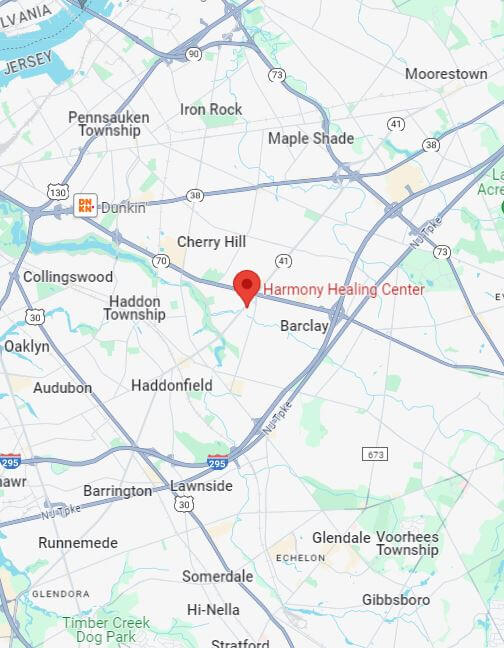Located in Cherry Hill, New Jersey, Harmony Healing Center offers comprehensive rehab treatment for individuals struggling with drug addiction. With a focus on holistic treatment approaches, Harmony Healing provides a safe environment where individuals can feel confident beginning their recovery journey.
At Harmony Healing Center, we understand that each person’s experience with addiction is unique, which is why we offer personalized rehab treatment programs designed to fit the needs of our patients. Our holistic approach integrates evidence-based therapies, counseling, and aftercare programs to address the physical, emotional, and psychological aspects of addiction. With compassionate care and a dedicated team of professionals, we strive to help individuals reclaim their lives and experience sober living. To learn more about the programs we offer at our drug addiction treatment center in New Jersey, contact us online or call a member of our team at (888) 409-5356.
What Is Drug Addiction?
Drug addiction is a chronic and complicated condition described by compulsive drug seeking, use, and cravings despite harmful side effects. It leads to changes in behavior, reasoning, and emotional regulation. Individuals with drug addiction often struggle to complete tasks at work or school and may not take care of daily responsibilities.
Drug addiction can stem from various factors, including genetic predisposition, environmental influences, and underlying mental health conditions. It does not discriminate against people based on age, gender, or social status. It may involve a range of substances, from illicit drugs like heroin and cocaine to prescription medications and alcohol. Drug addiction can have horrible effects on individuals, families, and communities, leading to legal issues, financial problems, health complications, and strained relationships. However, with appropriate treatment, support, and interventions, addiction recovery is possible. Harmony Healing Drug and Alcohol Addiction Treatment Centers are ready to help those struggling with alcoholism and drug addiction. To help initiate the recovery journey, call (888) 409-5356 or contact us for help accessing the recovery resources you need.
Dangers of Drug Abuse and Addiction
One of the main dangers of drug abuse is the risk of lethal overdose. There are many potential downsides to abusing drugs, but losing your life is the worst scenario. Risk of overdose increases when you isolate yourself and refuse to allow anyone to help. Most drugs affect the brain’s reward circuitry and provide surges of feel-good hormones, such as dopamine and serotonin, that reinforce the use of medications as pleasurable.
This leads to people repeating the behavior repeatedly to their detriment.
Commonly Abused Substances
- Marijuana
- Opioids (painkillers)
- Depressants (benzos, barbiturates, z-drugs)
- Stimulants (cocaine, meth)
- Hallucinogens
Marijuana Abuse
Individuals can take marijuana by smoking, eating, or vaping the drug. Cannabis is known as a “gateway” drug for other, more harsh substances such as alcohol and illegal drugs.
Signs of recent abuse include:
- sense of euphoria
- heightened visual, auditory, or sensate perception
- increased heart rate
- high blood pressure
- red eyes
- dry mouth
- decreased coordination
- difficulty concentrating or remembering
- slow reaction times
- anxiety or paranoia
Opioid Abuse
Opioids are narcotics used to treat pain, whether prescribed or obtained illegally. This class of drugs includes heroin, morphine, codeine, methadone, fentanyl, and others. What was once known as the “opioid epidemic” is now considered a fentanyl epidemic in the US. An alarming rate of fentanyl overdoses have and continue to occur since 2020.
Signs of opioid abuse and addiction can include:
- reduced pain
- agitation and irritability
- drowsiness and sedation
- slurred speech
- difficulty remembering
- small, pinpoint pupils
- lack of awareness
- problems with coordination
- depression
- confusion
- constipation
- runny nose and flu-like symptoms
- needle marks on the arm or between the toes
Depressant Abuse
Central nervous system depressants include benzodiazepines, barbiturates, and sleep medications, also known as z-drugs. These drugs are used to “switch off” fight-or-flight feelings and help promote relaxation.
Potential signs of CNS depressant abuse can include:
- drowsiness
- slurred speech
- lack of coordination
- rapid changes in mood
- memory issues
- involuntary eye movements
- lack of inhibition
- falls and accidents
- slowed breathing rate
- low blood pressure
Stimulant Abuse
Stimulants include amphetamines, meth, cocaine, and prescription medications such as Ritalin, Concerta, and Adderall. They’re commonly used to boost energy, improve work or school performance, and lose weight.
Signs and symptoms of stimulant abuse can include:
- feeling happy and extra confident
- increased alertness
- increased restlessness
- changes in behavior
- excess aggression
- rapid speech
- large pupils
- poor judgment
- insomnia
- depression as the drug wears off
Hallucinogen Abuse
Misusing hallucinogens can produce different symptoms depending on the drug. Lysergic acid diethylamide (LSD) and phencyclidine (PCP) are the more frequently abused hallucinogens.
LSD abuse may cause:
- hallucinations
- reduced perceptions of reality
- impulsive behavior
- rapid shifts in emotions
- permanent mental changes in perception
- rapid heartbeat
- high blood pressure
- tremors
- flashbacks
PCP abuse may cause:
- feeling separate from your body
- hallucinations
- aggressive, potentially violent behavior
- involuntary eye movements
- lack of pain sensation
- problems speaking or thinking
- poor judgment
- Intolerance to loud noises
- some cases, seizures or coma
Contact Us for a Free Assessment
Are you ready to turn the page and begin a new chapter in your story? We have the tools you need to transform your life. Let’s talk about what’s next.

What Is a Drug Abuse Rehab Center?
A drug abuse rehab center is a facility specifically designed to provide comprehensive treatment and support for individuals struggling with substance use disorders. These centers offer many services tailored to each patient’s unique needs, including medical detoxification, therapy (group and individual), medication-assisted treatment, and holistic approaches to recovery.
In 2022, statistics revealed that 24.7% of alcohol users in New Jersey sought admission to a drug rehab center, while 12.5% required treatment for alcohol use along with another substance. These figures emphasize the importance of drug addiction treatment centers in New Jersey in addressing substance use disorders. Such facilities provide structured programs and therapies and offer supportive environments for individuals seeking substance abuse treatment.
To begin the recovery process at Harmony Healing Alcohol and Drug Addiction Treatment Center, schedule a free assessment to help determine the recovery programs that best meet your treatment needs, or contact us at (888) 409-5356 for assistance.

Drug Addiction Treatment Center in New Jersey
Harmony Healing Center is a leading New Jersey rehabilitation located at 401 Kings Highway S in Cherry Hill, NJ 08034 Jersey. Treatment options include partial hospitalization programs (PHP), intensive outpatient programs (IOP), medication-assisted treatment (MAT), and general outpatient services. Harmony Healing offers evidence-based therapies and strives to help patients on their journey to recovery and long-term sobriety.
How to Find a New Jersey Drug Addiction Rehab Facility Near Me
Locating a drug addiction and withdrawal rehab facility in New Jersey demands thorough assessment and research. To help you find the best recovery facility, here’s a comprehensive step-by-step guide that outlines the crucial aspects to consider and actions to take when seeking appropriate treatment options.
Steps to find a rehab facility
Harmony Health Center – Cherry Hill, New Jersey
401 Kings Highway South
Building #1 Tara Corporate Park
Cherry Hill, NJ 08034
Treatment Programs for Drug Addiction Rehab in South Jersey
In South Jersey, various treatment programs are available to address drug addiction rehab needs comprehensively. These programs encompass a range of options tailored to meet individual requirements and preferences. From residential and outpatient treatment to medication-assisted therapy, individuals can access diverse programs aimed at working toward drug detox.
South Jersey Partial Hospitalization Programs (PHP) for Drug Rehab
South Jersey Intensive Outpatient Program (IOP) for Drug Rehab
South Jersey Residential Program for Drug Rehab
South Jersey Detox Treatment for Drug Rehab

Will Health Insurance Pay for Drug Rehab Treatment Programs?
Health insurance coverage for drug rehab treatment can depend on your provider and policy. Many health insurance plans offer coverage for treatments, including detoxification, inpatient rehab, outpatient therapy, and medication-assisted treatment (MAT). The extent of coverage, including the types of programs covered and the amount of financial assistance provided, may vary.
Reviewing your health insurance policy will help you determine if you can get treatment for a New Jersey rehab for drug addiction. Contact your insurance provider to learn about coverage available to you. Or, contact us at Harmony Healing Addiction Treatment Center in New Jersey for assistance with insurance verification and help determining your insurance coverage and other financial options for treatment.
Health Insurance Companies That Cover Rehab Treatment for Drug Addiction
Most major health insurance companies will provide coverage for rehab treatment for drug addiction. Blue Cross Blue Shield (BCBS), Aetna, Cigna, UnitedHealthcare, and Anthem are among the large providers known to offer plans that include coverage for substance abuse treatment.
Coverage specifics can differ depending on the individual’s plan, so reviewing your policy is crucial to understanding your treatment options thoroughly. Some providers may cover services such as detoxification, inpatient or residential rehab, outpatient therapy, medication-assisted treatment (MAT), and other forms of addiction counseling. Harmony Healing Substance Addiction Treatment Center helps with insurance verification to help individuals determine their coverage options. Contact us at (888) 409-5356 for more information on your benefits and to determine if your therapy needs are covered.
How Much Do NJ Treatment Programs for Drug Addiction Recovery Cost without Health Insurance?
The cost of drug addiction treatment programs in New Jersey without health insurance can depend on the type of program, the duration of treatment, and the services offered. On average, outpatient programs may range from $3,000 to $10,000 for a three-month program, while inpatient programs may cost anywhere from $10,000 to $30,000 for a 30-day program.
It’s important to note that these figures are estimates, and actual costs can differ significantly based on individual circumstances and the specific treatment center. Additionally, many treatment facilities offer financial assistance options to help make treatment more affordable for those without insurance coverage. Harmony Healing Addiction Center in New Jersey has many options to help offset the cost of treatment. To learn more, contact us to verify your insurance coverage and determine your eligibility for financial assistance for treatment.
How to Tell if Someone Has a Substance Use Disorder (SUD) Warning Signs of Drug Addiction
Identifying substance use disorder (SUD) is essential for providing timely support and intervention. By recognizing these indicators, individuals can take proactive steps to address their substance misuse or help others seek assistance. Being vigilant about knowing the signs of SUD can facilitate early intervention and improve the chances of successful recovery from substance use disorders.
Signs of SUD can include:
- Changes in Behavior: Individuals with SUD may exhibit noticeable shifts in their behavior, such as becoming secretive, withdrawing from social activities, or experiencing sudden mood swings.
- Physical Symptoms: Physical signs of substance misuse can include bloodshot eyes, frequent nosebleeds (for cocaine users), or unexplained weight loss or gain.
- Neglecting Responsibilities: People struggling with an SUD may neglect their responsibilities at work, school, or home, leading to a decline in performance or attendance.
- Financial Problems: Borrowing money excessively, selling personal belongings, or facing unexplained financial strain may suggest substance misuse.
- Relationship Issues: Substance misuse can strain relationships with family members, friends, or colleagues due to erratic behavior, conflicts, or broken promises.
- Tolerance and Withdrawal: Developing tolerance to a substance and dealing with withdrawal symptoms when trying to quit are typical signs of a SUD.
Similar to other diseases, such as heart disease, addiction can lead to severe harmful effects which may have been preventable. If left without treatment, addiction can alter individuals physically and mentally for a lifetime, eventually leading to death.
Other signs signs to watch for:
- Changing friend groups often
- Spending a lot of time alone
- Losing interest in your favorite things
- Not taking care of yourself or others
- Constantly being tired or sad
- Eating more or less than usual
- Being hyper, energetic, talking fast, or saying things that don’t make sense
- Missing important appointments
Recognizing the signs of an SUD is crucial for prompt intervention and support. By fostering awareness and understanding of SUD, individuals can play an active role in addressing substance misuse and promoting healthier, fulfilling lives for themselves and others. If you or someone you know has a cocaine addiction, you don’t have to feel ashamed. Many others are addicted to this drug, and it can be tough to quit on your own.
Our free 24/7 hotline is available whenever you need it.Harmony Healing Center has resources available to help you or someone you know treat substance use disorder. Contact us at (888) 409-5356 to learn about our comprehensive rehab treatment programs.
Rehab Process for Drug Addiction Treatment in New Jersey
Navigating the rehabilitation process for drug addiction treatment in New Jersey demands a thorough comprehension of the multifaceted steps involved. Each phase is vital in reaching recovery from initial assessment to aftercare planning. Here’s a detailed breakdown to provide you with a clear and informed path forward:

- Assessment and Evaluation: The first step typically involves medical professionals examining and evaluating the patient to determine the severity of the addiction and the right treatment plan.
- Detoxification: For many individuals, the next stage is detoxification, where the body rids itself of the substance. This process can be challenging and may require medical supervision to manage withdrawal symptoms safely.
- Individualized Treatment Plan: Following detoxification, medical professionals will work with patients to develop a unique treatment plan to address specific needs and goals for recovery. This plan may include behavioral therapy, counseling, medication-assisted treatment, and other supportive services.
- Therapy and Counseling: Counseling and therapy sessions are essential components of drug addiction treatment, helping individuals address underlying issues, learn coping mechanisms, and develop relapse prevention strategies. They may also be encouraged to join a twelve-step program for further recovery treatment.
- Aftercare Planning: As individuals progress through treatment, aftercare planning becomes crucial to ensure a smooth transition back to everyday life. Aftercare planning may involve continued therapy, support groups, sober living arrangements, and ongoing medical care.
Harmony Healing Center is ready to help individuals with the rehab admissions process. Talk to our admissions team or call (888) 409-5356 to learn more about the rehab process at our treatment facility.
Free Evaluation and Assessment for Drug Addiction in Southern New Jersey
At Harmony Healing Center in Southern New Jersey, we know the importance of an accurate assessment in guiding effective treatment plans for drug addiction. As part of our mission to provide comprehensive care, we offer a free evaluation and assessment service to individuals seeking treatment.
This complimentary assessment will gather essential information about each patient’s unique circumstances, including the nature and severity of their addiction, medical history, and any dual diagnosis present. Our experienced team of addiction treatment professionals conducts thorough screenings and interviews during the evaluation and assessment process to gain insight into the individual’s substance abuse patterns, overall physical health, and psychological well-being. This process allows us to create individualized treatment plans for each patient. We aim to remove barriers to accessing treatment by offering free service.
To initiate the drug addiction treatment process at Harmony Healing Rehab Center, schedule a free assessment online or call us at (888) 409-5356.
New Jersey Substance Use Disorder Admissions Process
Navigating the admissions process for substance use disorder treatment in New Jersey is an essential step toward initiating recovery. It can be confusing and overwhelming for some. This simple yet comprehensive guide offers critical insights to assist you in your journey:
- Initial Assessment: The admissions process typically begins with an initial assessment conducted by the treatment facility. This assessment may involve a series of questions about your substance use history, medical background, and treatment goals. It helps the treatment team determine the best level of care and provide a personalized treatment plan.
- Verification of Insurance Coverage: It’s essential to verify your coverage for substance use disorders. Contact your insurance plan provider to understand your benefits and confirm which treatment services are covered. Many treatment facilities, including Harmony Healing Center, work with insurance providers to help individuals access the necessary care.
- Financial Assistance Options: Exploring financial assistance options is crucial for those finding themselves without insurance or with limited coverage. Treatment facilities may offer sliding scale fees, payment plans, or scholarship programs to make treatment more affordable. Additionally, government assistance programs and nonprofit organizations may support substance use disorder treatment financially.
Understanding and navigating the admissions process for substance use disorder treatment in New Jersey is a critical step toward embarking on the path to recovery. By arming individuals with this knowledge, we aim to alleviate some of the confusion and uncertainty often associated with seeking treatment. Remember, you are not alone on this journey, and there are resources and support available at Harmony Healing Center to help you take the first steps toward a healthier, substance-free life. Contact us at (888) 409-5356 to find the treatment plan that is best for your treatment needs.
Finding Drug Addiction Treatment Near You
There’s hope for recovery no matter which substances you’re addicted to. Whether it’s one or multiple substances, the treatment team at Harmony Healing is here to assist you in achieving your sobriety goals.
Contact our addiction treatment helpline today to schedule a free assessment, or ask us to check your insurance. You can also get information on the cost of rehab without insurance.
You can get your life back starting right now with one phone call.
New Jersey (NJ) Drug Addiction Statistics and Information
The Garden State’s Famous Towns and Attractions
Contact Harmony Healing Center
Get personalized help from an empathetic professional.
